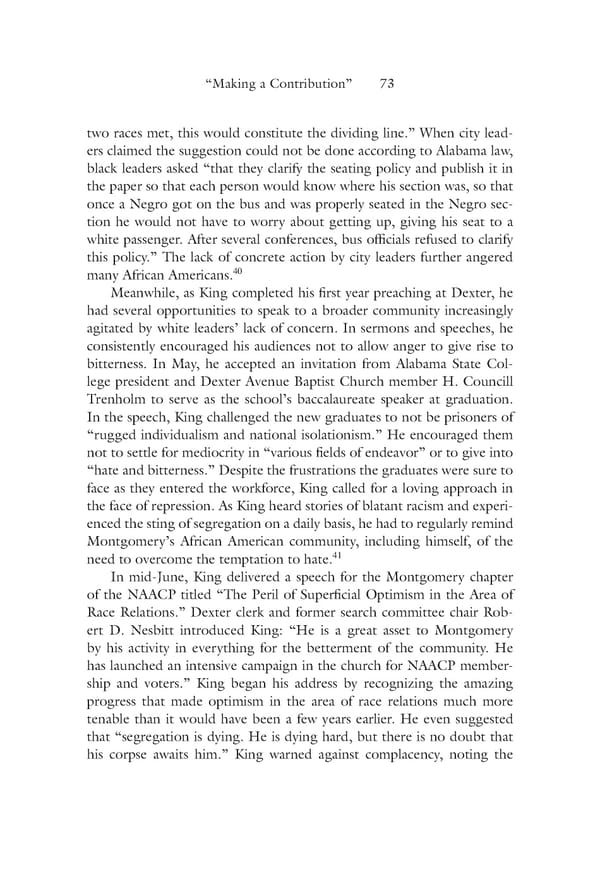“Making a Contribution” 73 two races met, this would constitute the dividing line.” When city lead- ers claimed the suggestion could not be done according to Alabama law, black leaders asked “that they clarify the seating policy and publish it in the paper so that each person would know where his section was, so that once a Negro got on the bus and was properly seated in the Negro sec- tion he would not have to worry about getting up, giving his seat to a white passenger. After several conferences, bus officials refused to clarify this policy.” The lack of concrete action by city leaders further angered 40 many African Americans. Meanwhile, as King completed his first year preaching at Dexter, he had several opportunities to speak to a broader community increasingly agitated by white leaders’ lack of concern. In sermons and speeches, he consistently encouraged his audiences not to allow anger to give rise to bitterness. In May, he accepted an invitation from Alabama State Col- lege president and Dexter Avenue Baptist Church member H. Councill Trenholm to serve as the school’s baccalaureate speaker at graduation. In the speech, King challenged the new graduates to not be prisoners of “rugged individualism and national isolationism.” He encouraged them not to settle for mediocrity in “various fields of endeavor” or to give into “hate and bitterness.” Despite the frustrations the graduates were sure to face as they entered the workforce, King called for a loving approach in the face of repression. As King heard stories of blatant racism and experi- enced the sting of segregation on a daily basis, he had to regularly remind Montgomery’s African American community, including himself, of the 41 need to overcome the temptation to hate. In mid-June, King delivered a speech for the Montgomery chapter of the NAACP titled “The Peril of Superficial Optimism in the Area of Race Relations.” Dexter clerk and former search committee chair Rob- ert D. Nesbitt introduced King: “He is a great asset to Montgomery by his activity in everything for the betterment of the community. He has launched an intensive campaign in the church for NAACP member- ship and voters.” King began his address by recognizing the amazing progress that made optimism in the area of race relations much more tenable than it would have been a few years earlier. He even suggested that “segregation is dying. He is dying hard, but there is no doubt that his corpse awaits him.” King warned against complacency, noting the
 Becoming King: Martin Luther King Jr. Page 93 Page 95
Becoming King: Martin Luther King Jr. Page 93 Page 95